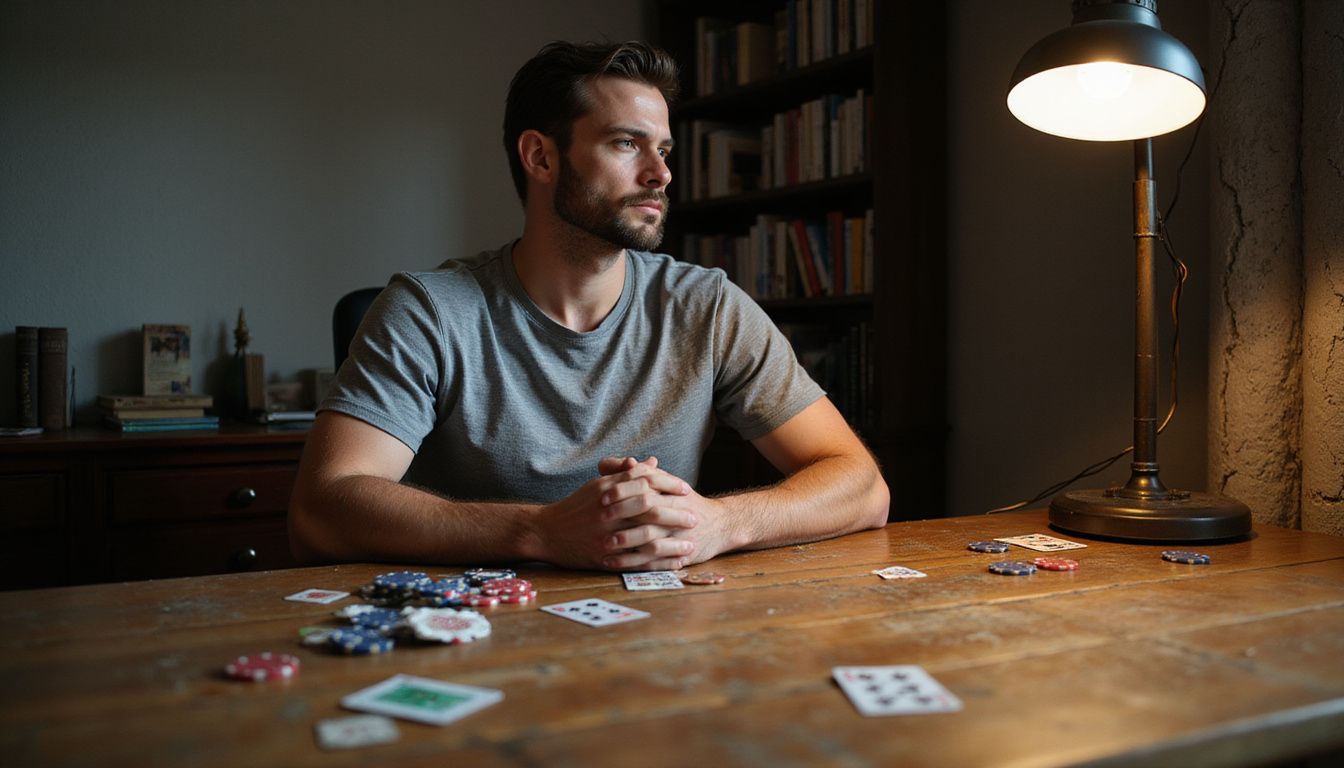You’ve practiced your poker moves and studied the best strategies. Yet, you still feel tired and unfocused during crucial moments at the table. Many players skip their mental warm-up routine for poker sessions, leading to costly mistakes and missed opportunities.
Your mind needs proper preparation, just like athletes warm up before a big game.
Research shows that poker players who follow a pre-game routine win 23% more often than those who don’t. A solid mental warm-up helps you stay sharp, make optimal decisions, and control your emotions under pressure.
Think of it as your mental gym session before hitting the poker tables.
This guide will walk you through a proven five-step mental preparation system. You’ll learn how to eliminate distractions, reflect on past games, and use powerful visualization techniques.
Ready to transform your poker performance? The winning moves start before you even pick up your cards.
Importance of a Mental Warm-Up for Poker Success

Mental preparation stands as the backbone of poker success. Top poker players know that a solid warm-up routine leads to better decisions at the table. A pre-game routine helps control emotions and prevents tilt during intense moments.
Studies show that players who spend 30 minutes on mental preparation make more profitable choices during their sessions. The right mindset creates a shield against the mental fatigue that often creeps in during long poker games.
A proper poker warm-up acts like a mental gym session for your brain. Players who practice meditation and mindfulness before games report sharper focus and clearer thinking. The brain needs time to shift from daily stress to poker mode.
Smart players use this transition period to review past hands and plan their strategy. Getting enough sleep and exercise earlier in the day adds extra power to your mental preparation.
These habits build a strong foundation for making optimal decisions under pressure.
Step 1: Eliminate Distractions
A cluttered poker setup clouds your judgment and kills your focus. Your phone buzzes and social media alerts pop up like unwanted guests at a party, making it hard to spot those million-dollar tells from your opponents.
Clean your playing environment
Your poker space needs to stay clean and organized for optimal focus. Clear tables help your brain work better during intense poker sessions. Start by removing empty cups, snack wrappers, and random papers from your playing area.
Put away your phone, close unused browser tabs, and shut down distracting apps. Studies show that players make better decisions in tidy spaces because their minds stay sharp and alert.
A clear space creates a clear mind for poker success.
Physical clutter leads to mental clutter, which hurts your poker performance. Keep only the essentials within arm’s reach: water, a small healthy snack, and any tools you need for tracking hands or taking notes.
Your playing environment directly impacts your thought process and decision-making skills at the table. Many world poker tour pros maintain spotless playing areas as part of their winning routines.
This simple habit helps prevent feeling tired and keeps you focused on making optimal decisions throughout your session.
Turn off unnecessary devices and notifications
A clean poker space leads right into the next vital step of your mental preparation. Your phone buzzes. Social media pings. Email alerts pop up. These digital distractions can wreck your poker performance faster than a bad beat.
Top poker players know that notifications trigger dopamine hits that break focus during crucial moments.
Silence your phone or put it in another room. Close all browser tabs except those needed for poker. Switch off alerts from messaging apps and social platforms. This simple act helps control emotions and prevents tilt during intense poker sessions.
Studies show that each notification can disrupt concentration for up to 23 minutes. A focused mind makes optimal decisions at the table, leading to more winning sessions.
Step 2: Reflect on Previous Sessions
Your past poker sessions hold valuable lessons. Take 10 minutes before each game to review your hand histories and spot patterns in your play style.
Review key hands and mistakes
Looking back at past poker hands reveals vital lessons for growth. Smart players take notes on their biggest wins and losses from recent games. They spot patterns in their decision-making and track emotional responses during tough spots.
This review process helps build a stronger poker mindset and prevents making the same mistakes twice.
A champion learns more from losses than wins. – Anonymous
Past mistakes serve as stepping stones to better poker performance. Players who study their hand histories catch leaks in their strategy faster than those who don’t. Taking 15 minutes before each session to analyze previous plays sharpens decision-making skills.
This reflection primes your brain to make optimal decisions in upcoming games. Now, let’s explore how mindfulness techniques can further enhance your mental game.
Identify areas for improvement
After reviewing past hands, smart poker players dig deeper into their game patterns. Your mistakes point straight to areas that need work. A solid poker mindset requires honest self-assessment of your weak spots.
Take notes on spots where you felt unsure or made costly errors. Track patterns in your decision-making that led to losses.
Focus on specific skills that need sharpening. Maybe you fold too often in three-bet pots, or you struggle with position play. Break down each problem area into smaller, workable chunks.
Set clear goals to improve these spots during your next poker session. The best poker strategies come from fixing leaks one at a time. Your optimal decisions will increase as you tackle each weakness head-on.
This targeted approach helps build a stronger overall game.
Step 3: Practice Mindfulness
A clear mind leads to sharp poker decisions. Take five minutes before each session to quiet your thoughts through mindfulness – it works like a mental reset button.
Use meditation techniques to calm the mind
Meditation serves as a powerful tool for poker players to steady their minds before crucial sessions. Five minutes of focused breathing can clear mental clutter and boost your poker performance.
Start by sitting in a quiet spot, close your eyes, and pay attention to your natural breath pattern. This simple practice helps poker players stay calm under pressure and make optimal decisions at the table.
Many poker pros use basic meditation to control their emotions and avoid going on tilt during intense games. The practice trains your brain to notice distracting thoughts without getting caught up in them.
Focus on taking slow, deep breaths while letting go of worries about past hands or future outcomes. This mental preparation creates the right mindset for making clear-headed choices during your poker session.
Your mind becomes sharper and more alert through regular meditation practice before games.
Focus on breathing exercises
Breathing exercises form a vital part of your poker warm-up routine. Simple deep breaths can steady your mind and help you make optimal decisions at the table. Take five slow breaths through your nose, hold for three seconds, then release through your mouth.
This basic pattern calms your nervous system and prepares you for intense poker sessions.
Your breath acts as an anchor to keep you focused during tough hands. Pro poker players often use the 4-7-8 breathing technique before big tournaments. Breathe in for four counts, hold for seven counts, then exhale for eight counts.
This method cuts through mental noise and stops you from tilting during challenging moments. A clear head leads to better choices and more profitable sessions at the table.
Step 4: Visualization Techniques
Your mind holds the power to shape your poker success through mental practice. Picture yourself at the table making perfect calls and folds, just like pro athletes who mentally rehearse their winning moves before a game.
Imagine successful plays and decision-making
Picture yourself making perfect calls at the poker table. See yourself spotting tells, reading opponents, and executing brilliant bluffs with confidence. Mental rehearsal helps your brain create neural pathways for optimal decisions during actual gameplay.
Top poker players spend 30 minutes before each session running through successful scenarios in their minds.
Visualization builds a positive poker mindset and reduces anxiety at the table. Close your eyes and run through specific hands where you make smart folds, calculate pot odds correctly, and maintain emotional control.
This mental practice primes your brain to stay focused and make better choices unconsciously during real play. Studies show that players who practice visualization techniques experience fewer emotional swings and maintain better discipline during tough sessions.
Build confidence with mental rehearsals
Mental rehearsals boost your poker performance through proven visualization methods. Picture yourself making smart calls, folding marginal hands, and staying cool under pressure. Top poker players spend 30 minutes before each session running through perfect plays in their minds.
This practice builds a mental shield against tilt and creates winning patterns in your brain.
Your mind needs clear images of success to perform at its peak during poker sessions. Start by sitting quietly and seeing yourself handle tough spots with confidence. Feel the satisfaction of making optimal decisions at the table.
Mental practice helps you stay focused and disciplined during actual gameplay. The more you rehearse positive outcomes, the more natural they become during real poker action.
Step 5: Set Clear Goals for the Session
Every poker session needs clear targets to keep you on track. You’ll make smarter choices at the table when you map out your goals and bankroll limits before you start playing.
Define strategic objectives
Strategic objectives shape your poker path to success. Smart players set clear targets before each session, like “I will fold marginal hands in early position” or “I will stay focused for four hours straight.” These goals keep you locked in on what matters most during play.
Your objectives should link directly to your overall poker growth, not just quick profits.
Setting clear goals helps you dodge emotional plays and stay disciplined at the table. A solid poker mindset starts with writing down two or three specific aims for each session. Think about areas where you need work, based on your recent performance.
Maybe you need to improve your bluff detection or tighten up your opening ranges. Match these goals to the lessons from your previous sessions and study time. This focused approach leads to better decisions and fewer mistakes during intense moments of play.
Plan how to stay disciplined
Set clear limits on your bankroll before each poker session. Pick a stop-loss number that matches your comfort level and stick to it no matter what. Smart poker players create firm rules about when to quit, both in winning and losing situations.
This helps you avoid the common trap of chasing losses or getting too confident during hot streaks.
Your discipline plan needs specific action steps for tough moments at the table. Write down three responses you’ll use when facing tilt triggers. For example, take three deep breaths, count to ten, or step away for five minutes.
A good night’s sleep and 30 minutes of exercise earlier in the day will boost your self-control during play. Let’s move forward to wrap up our discussion about mental preparation for poker success.
Conclusion
Your mental warm-up shapes your poker success more than any fancy strategy. A clear mind leads to better decisions at the table, just like a champion athlete preps before a big game.
These five steps form your winning formula: create a distraction-free zone, learn from past games, practice mindfulness, visualize success, and map out your goals. Mental preparation builds the foundation for consistent wins and helps you dodge those nasty tilt moments.
Take action now by picking one warm-up technique and testing it in your next poker session. Your future self will thank you for building these habits that turn average players into poker pros.
FAQs
1. What makes a good poker warm-up routine?
A solid poker warm-up routine combines meditating, reviewing poker theory, and mental exercises. Your mind needs prep work just like athletes warm up their muscles before a game.
2. How long should I spend on mental preparation before a poker session?
Dedicate 15-20 minutes to prime your mind before sitting at the table. This gives your poker mindset time to shift into game mode.
3. Why do professional poker players emphasize mental preparation?
Mental preparation directly impacts poker performance at the tables. Top poker players know that a clear head leads to better decisions, sharper focus, and stronger emotional control during tough spots.
4. What are the key elements of a pre-game mental routine?
A winning pre-game routine starts with deep breathing to calm your nerves. Next, review your poker strategy notes and visualize successful plays. Finally, set clear goals for your poker session to keep your mind focused on profitable decisions.








